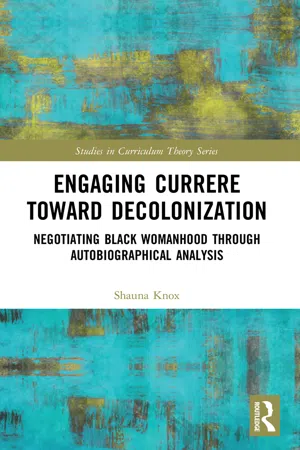
Engaging Currere Toward Decolonization
Negotiating Black Womanhood through Autobiographical Analysis
- 196 pages
- English
- ePUB (mobile friendly)
- Available on iOS & Android
Engaging Currere Toward Decolonization
Negotiating Black Womanhood through Autobiographical Analysis
About This Book
This timely volume uniquely illustrates how currere can be applied to the process of decolonizing subjectivity. Centered around the experiences of one black woman from the third world, the text details the theoretical underpinnings of Currere towards Decolonizing (CTD), and walks the reader through the autobiographical analysis involved in dismantling cognitive colonization.
Conceived as a four-part autobiographical process of remembering, identifying, imagining, and decolonizing, the method of CTD is demonstrated as a means of recognizing and reflecting on how the colonial project has been internalized, and of gradually dismantling the psychological, affective, and material impact of colonization. Using both theoretical and experiential standpoints, and intersecting with notions of anti-blackness, linguicide, and Africana womanhood, the volume moves curriculum theory urgently towards anti-colonial mechanisms that disrupt the colonizing process.
This text will benefit researchers, academics, and educators in higher education with an interest in curriculum studies, post-colonialism, and Black studies more broadly. Those specifically interested in interpersonal psychoanalysis, as well as gender and third world studies, will also benefit from this book.
Frequently asked questions
Information
1 The Essential Elements of My Decolonization
The Dissolution of Humanity
Diamond:“You told him to get his ID sir [MASTER], his driver’s license. Oh my God, please don’t tell me he’s dead. Please don’t tell me my boyfriend just went like that.”Officer:“Keep your hands where they are!”Diamond:“Yes I will sir [MASTER]. I’ll keep my hands where they are. Please don’t tell me this, Lord. Please Jesus, don’t tell me that he’s gone. Please don’t tell me that he’s gone. Please officer don’t tell me that you just did this to him. You shot four bullets into him, sir [MASTER]. He was just getting his license and registration, sir [MASTER].”Officer:“Get the female passenger out!”Second Officer:“Ma’am, exit the car right now with your hands up! Let me see your hands. Exit now! Keep ’em up! Keep’em up!”
Mr. Kartoffel, Theophilus Jones, and the Emerging Shauna Knox
Says he, “If my wife and I should chooseTo wear our stockings outside our shoes,Plant tulip bulbs in the baby’s pramAnd eat tobacco instead of jamAnd fill the bath with cauliflowers,That’s nobody’s business at all but ours.”(Prelutsky, 1983)
Eventually, way out in the deep,he stopped,floated for a while, enjoying the sun,watched a plane take off from the green-rimmedpalisades, and then, letting himself go,allowed the waterto swallow him up.(Prelutsky, 1983)
Subject and Crown
Blackness, Africana Womanism, and Third Worldism
Blackness
Africana Womanism
Table of contents
- Cover
- Half Title
- Series Page
- Title Page
- Copyright Page
- Dedication
- Contents
- Foreword
- Acknowledgements
- 1 The Essential Elements of My Decolonization
- The Dissolution of Humanity
- Mr. Kartoffel, Theophilus Jones, and the Emerging Shauna Knox
- Subject and Crown
- Blackness, Africana Womanism, and Third Worldism
- Blackness
- Africana Womanism
- Third Worldism
- School as an Ideological State Apparatus
- Decolonization and Subjectivity
- Decolonizing in Third Space
- Purpose and Research Questions
- Significance
- Theoretical/Conceptual Framework
- Third Space Activation of the Decolonial Imaginary
- Colonization as Trauma
- Autobiographical Inquiry
- Summary of Method
- Conclusion
- Note
- References
- 2 A Brief History of the Colonization of Subjectivity
- Critical Constructs of the Study
- Blackness
- Third Worldism
- Africana Womanism
- Research Conversation: Epidermalizing, the Sociogenic Principle, Objective Truth, and Practical Intervention
- Organizing Principles: Incommensurability, Reconciliation, and Decolonization as Journeying
- Decolonization as Praxis
- The Construct of Western Epistemic Dominance
- The Construct of Subjectivity
- Exploring Subjectivity in Third Space: The Decolonial Imaginary
- The Process of Currere
- Autobiographical Memory
- References
- 3 Decolonizing The Currere toward Decolonizing Method
- Overview of Methodology
- Currere toward Decolonizing
- Currere toward Decolonizing: Process Outline
- Critical Lenses in the Imagining Stage of CTD
- Deconstruction as Critical Lens
- Problematization as Critical Lens
- Self-understanding as Critical Lens
- Response to the Call as Critical Lens
- Contradiction as Critical Lens
- Research Expectations
- Procedures
- References
- 4 Currere toward Decolonizing Autobiographical Studies
- CTD Studies
- CTD Study I: Decolonizing Linguicide
- Remembering
- Identifying
- Imagining
- Decolonizing
- CTD Study II: Decolonizing Self-reflexive Invisibility
- Remembering
- Identifying
- Imagining
- Decolonizing
- CTD Study III: Decolonizing Imposed Vocationality
- Remembering
- Identifying
- Imagining
- Decolonizing
- CTD Study IV: Decolonizing Denegrification through the Internalized Gaze of the Crusader
- Remembering
- Identifying
- Imagining
- Note
- References
- 5 Decolonization Discoveries
- Discoveries from Decolonizing
- The Leverage of Gender among the Colonized
- The Subjectivity as Colonized Terrain
- The Era for Optimal Colonial Insurgency
- The Co-occupation of Unrelinquished Subjective Territory
- Is Decolonization Attainable? A Concluding Thought
- Vulgarity as Protest
- The Dehumanizing Effects of White Gaze
- Self-Inexpressibility That Leads to Self-Invisibility
- An Aside on the Absence of Contradiction
- Currere toward Decolonizing
- References
- Index